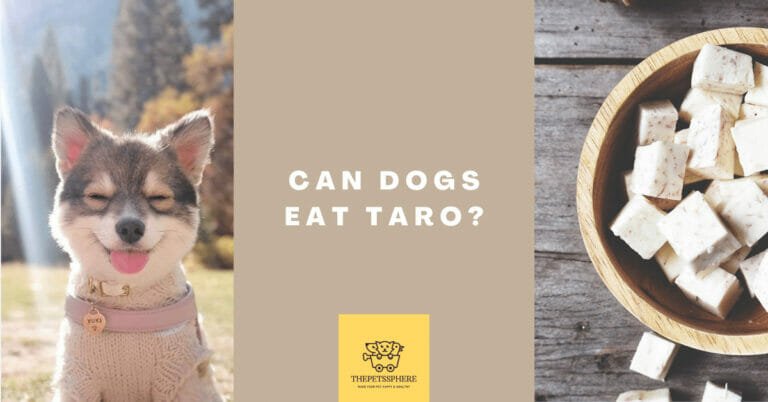Taro is a nutritious human food that is used to make several dishes but can dogs eat taro? Dog owners often believe that whatever food item their dog tends to eat is going to be beneficial to its health. However, that is not the case. Some food items do not immediately harm the dog but will have consequences down the road.
That said, Taro is not safe for your dog to consume either in cooked or raw form. The reason is the entire plant consists of toxic elements such as calcium oxalate which is poisonous to pets. Therefore, you have to be extremely careful and keep your dog away from the plant if Taro is something you use regularly in your meals.
Let’s take a closer look into what you should do if your dog eats taro along with safer and healthier alternatives to consider.
Is Taro safe for dogs?
Taro is a great source of nutrients and vitamins for humans but not safe for dogs. The primary reason is that dogs do not contain enzymes that are able to process human foods. If you observe that your dog is enjoying chewing on some Taro, you need to take it away before it raises serious health concerns.
On the other hand, even though taro is safe for humans but only in cooked form. If consumed raw, the plant contains compounds that can cause oral irritation. Both cooked taro corms and smaller taro corms are popular due to their sweet and nutty flavor in a variety of breads, puddings, etc. Plus, it contains dietary fiber, carbohydrates, potassium, magnesium, etc.
What are the hazards of feeding taro to dogs?
Most of the issues among canines when it comes to taro consumption relate to the insoluble calcium oxalates that do not break down in their systems. If you observe that your dog is experiencing difficulty in breathing and swallowing, you should know that taro is the culprit behind it.
Furthermore, the consumption of taro could also cause gastrointestinal obstruction, which also occurs due to the consumption of several types of human foods. In worst-case scenarios, a gastrointestinal obstruction may require surgery since the dog will not be able to pass the food item, leading to severe constipation.
Moving on, calcium oxalate crystals are the most common cause of kidney stones in humans. These stones can cause extreme pain and the same is the case with dogs. The last thing you would want is your dog experiencing organ damage or the formation of kidney stones that make it difficult to eat, drink, digest, etc.
What to do if your dog has eaten Taro?
The side effects of taro if consumed by your dog will depend on the amount consumed and the size of your dog. If you are suspecting that your dog has eaten Taro, you should immediately start to look around for evidence. Try to find any torn packages to find out the amount consumed.
Next, immediately consult your veterinarian and inform him/her about the amount consumed. The vet will provide directions and guidance to help prevent serious symptoms. At the same time, observe your dog for symptoms like diarrhea, burned skin, eye irritation, etc. Moreover, if your dog is experiencing an allergic reaction, you should see veterinary care. It might be that the dog is induced to vomit to flush the kidneys.
What healthier alternatives can I opt for?
There is no doubt that dogs love vegetables. That said, you should opt for alternatives like sweet potatoes, carrots, beet, etc. These are known to be dog-friendly veggies and do not harm the dog. Plus, they also contain essential nutrients and vitamins that will help your dog improve its health. However, that does not mean every vegetable is going to be friendly. If your dog is suffering from an underlying condition such as diabetes, you will need to consult your vet before offering a particular type of vegetable.
FAQs on dogs and taro!
Can dogs eat fried taro?
Yes, dogs can eat fried taro but only in moderation. Otherwise, raw Taro leaves and corms contain calcium oxalate crystals that could cause extreme pain in dogs. Therefore, the process of cooking helps reduce the number of toxins in Taro.
Does taro contain cyanide?
If consumed raw, taro contains cyanide. However, the cooking process reduces the occurrence of this compound and turns it into a nutritious treat. Make sure that you wear gloves as raw taro can lead to irritation when you touch it.
Can dogs eat cooked taro root?
Even though cooked taro root is delicious and nutritious for people but extremely toxic for dogs. You should avoid offering it even if your dog loves chewing on it. Instead, opt for other healthier alternatives.
Conclusion
Certain human foods like Taro can cause adverse reactions in canines. Therefore, before you offer something new to your pet, you should always perform thorough research and consult your vet. And plus, always keep an eye out for any symptoms to help your dog prevent any serious organ damage.

